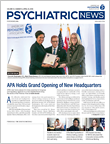Something has shifted in our collective consciousness since February 14, the day that 17 students and teachers died in a mass shooting in a high school in Parkland, Fla. The Parkland teen survivors are challenging us to examine a powerful behavioral dynamic in regard to the public health crisis of gun violence: the learned helplessness that has contributed to social and political passivity that underlies our inability to effect meaningful change. High school students all over America are demanding that we adults confront our failure to stem the public health crisis of the epidemic of gun violence and calling for action. And America is listening. I know because I was at the March for Our Lives rally in Washington, D.C., on Saturday, March 24.
We’re all familiar with the cycle that follows a mass shooting: horror, followed by shock and 24-hour media coverage, then outrage, then politicians blaming mental illness and avoiding discussion of guns, then insistence that this time it will be different and demands to “do something.” Then nothing changes. We slowly resume life as “normal,” even as we say that we can’t accept kids getting shot in school as the new normal. We hope it doesn’t happen again. And then it does. And it will again unless meaningful change takes place.
The clear voices of the teenage survivors in Parkland have driven home our society’s entrenched “learned helplessness” in regard to gun violence. This basic principle of behavioral theory posits that repeated traumatic events and/or the persistent failure to succeed in avoiding such events results in hopelessness and a sense of powerlessness, which in turn leads to passivity and inaction. Mental health professionals understand all too well that the inevitable result of learned helplessness is revictimization.
This psychological dynamic is often found to play a major part in the behavior of women caught in abusive relationships with intimate partners. Many women, who find attempts to leave or challenge the abuse leads to worsening of their circumstances, ultimately become hopeless and unable to take action to prevent the cycles of abuse. The result: over half of American women killed between 2003 and 2014 were killed in the context of domestic violence, most often by guns.
Like many abused women, we have allowed those with the power to effect change let us be revictimized over and over again. Each opportunity to do something that ends in failure to do anything increases our shared sense of learned helplessness. So we live through the same cycles of gun violence, not only of mass shootings, but also the everyday gun carnage that kills almost 100 people a day, including children and teens. After every high profile event, we desperately try to figure out how to extricate ourselves from this unacceptable situation. And we are told we can’t. But make no mistake: whether we live in resource-poor urban centers or gated communities, we and our children are all at risk.
The Parkland teens are not just survivors of another mass shooting; they are challenging the learned helplessness of our society. They have not lived through countless cycles of personal gun tragedy. Unlike many of their less privileged peers in urban centers where gun violence is a reality of day-to-day life, such as Chicago or Baltimore, they have not learned or accepted helplessness, powerlessness, or passivity. They reject the obvious: that revictimization is inevitable.
The grieving and angry voices of these traumatized but brave young people demand that we re-examine why we have accepted our politicians’ inaction and how we have failed to protect our children from the epidemic of gun violence. This epidemic is a uniquely American problem: the United States does not have more people with serious mental illness or a more violent population than any other comparable country. Yet we continue to allow ourselves to be killed and wounded by firearms at rates far and away higher than anywhere else in the world.
Let’s take our lead from the teenagers in Parkland. Let’s seize the moment these traumatized and brave young people have created. The American tragedy of gun violence that takes over 35,000 lives each year can be changed. Most Americans support interventions such as expanding background checks; closing the gun show loopholes; banning assault rifles and high-capacity magazines; raising the minimum age to purchase firearms to 21; and implementing gun violence restraining order legislation, which allows law enforcement to separate those in crisis from their firearms.
Why don’t politicians take bipartisan action that reflect their constituents’ positions? Who offers prayers for victims but refuses to take action to protect the living? Who accepts political and financial support from the National Rifle Association and then votes against any reasonable restriction of military-style weapons? Who argues against any proposed firearm law as likely ineffective, but supports the continued restriction of federal funds for gun violence research that could identify additional promising avenues for change?
We needed the Parkland teens to remind us that we are not helpless. At the March for Our Lives events in D.C. and all across the country, people showed up to be counted and to demand change. I was proud to participate and so inspired by the courage of all the young people, not only from Parkland, but from communities that have been struggling with gun violence for years. And I hope our political representatives were also reminded that we are not helpless; we can and will speak with our votes. And one day, like the teenagers in Parkland, so will all the other children who are watching. ■

